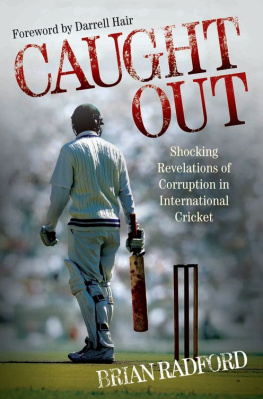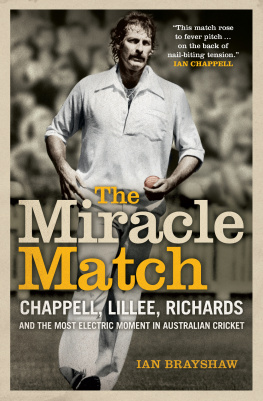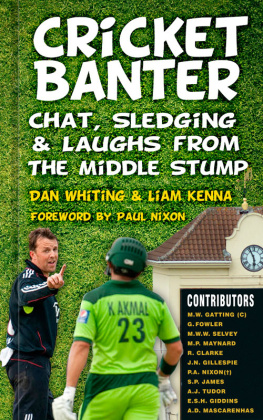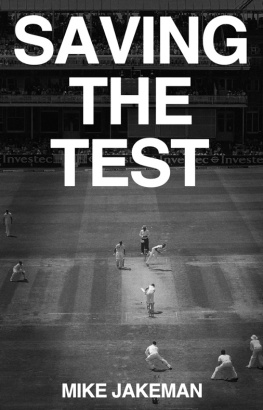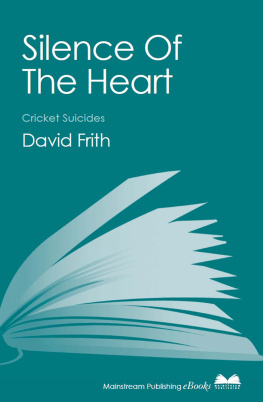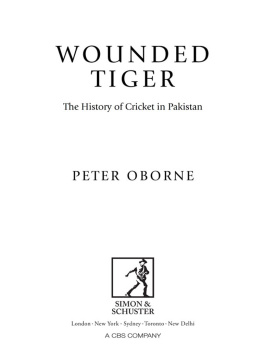To my wife, Jill, for her remarkable patience and support, and Toby, Rebecca, John, Emili and Faye
By Darrell Hair
I t is not often that a book about sport, and cricket in particular, delivers on all its promises and publicity. This book is one of those exceptions.
My career in cricket umpiring, and a lifetime in the game, has time and time again, told me that many people within it have an opinion about its dark side the cheating and under-performing for financial reward, which provides a fraudulent contest for those who genuinely believe they are watching a match that is being played, and won or lost, on its merits.
But when push comes to shove, few players, if any, are willing to say exactly what they know, or think, for fear of retribution from apathetic and ignorant administrators, or fearing that they will be ostracised by team-mates and driven from the game.
It is a shame when cricket administrators treat allegations of corrupt behaviour with apathy or absolute fear. One reason for this attitude could be the thought of their game being dragged through the mud and may, in the eyes of the public, ruin the values and spirit of the game that have been inherent in the culture of cricket for more than 280 years.
Crickets unique appeal has always been the willingness of players to accept an umpires decision, show respect for the laws of the game and its traditional values, and to believe that cheating has no part in it.
In the modern game, this spirit has sadly often been abused by unruly behaviour from players, open dissent towards decisions by umpires, and the advent of much more sinister behaviour in playing corruptly by manipulating the game for financial benefit.
It is this corrupt behaviour, and there can be no other words for it, that Brian Radfords book exposes, and cuts to the bone. The very core of the game has suffered because a greedy few have exploited cricket and, in doing so, produced a fraud on the public the very people whose support the professional player of the 21st century relies upon so heavily.
On the pages of this book, you will discover how the Anti-corruption Unit, which is run by the International Cricket Council, was continually frustrated by a conspiracy of silence, even though overwhelming evidence existed of illegal betting on such mundane things as the outcome of the toss for choice of innings.
The depth of unsavoury behaviour also extended to information being divulged to bookmakers, as to who would open the bowling in a particular match, and from which end of the ground.
Further startling revelations emerged as to how pitches were doctored midway through a match to ensure certain results, and how the ever-present metal bottle top was used by some players to scratch the ball to make it swing even more.
Corrupt behaviour and blatant cheating are to be abhorred. Immoral behaviour strikes at the very heart of our game. I took a stand in trying to stamp out such behaviour, and my reward was to be ostracised by the International Cricket Council, which later watered down its rules on ball-tampering, and dissent at an umpires decision.
Cricket should be sacrosanct. But it never will be, unless participants and administrators band together to stamp out corruption.
Brian Radfords book goes a long way to exposing the manner in which the game has been infected. His expos about the past may, hopefully, ensure that the game is cleansed of the greed and corruption, so that its future, and the future of its players, is beyond reproach. We must certainly hope so.
Darrell Hair,
Executive Officer,
NSW Cricket Umpires & Scorers Association Inc.
Darrell Hair is a distinguished Australian umpire who reached the peak of his profession when the International Cricket Council appointed him to its Elite panel. He officiated in 73 Test matches and 135 One-day Internationals before he retired in 2008, and was highly acclaimed for his fairness and integrity.
L ord Condons highly expensive Anti-corruption and Security Unit was set up in a plush office in south-west London in September 2001, funded by the International Cricket Council (ICC) to a reported 2 million. Condon, a former Commissioner of the Metropolitan Police, had been appointed three months earlier as Director of the Unit with a remit to recruit the best team of available investigators to mastermind and launch a worldwide search for the cheats and crooks who were corrupting international cricket matches, and had being doing so systematically for at least 20 years.
A former chief superintendent from New Scotland Yard was appointed senior investigator, and two other former high-ranking detectives were added to the team, along with a security adviser, a systems manager to establish an intelligence database, and a full-time secretary, who acted as office manager.
Condon was directly accountable to Malcolm Gray, President of the ICC, and he began his mammoth task by stressing that confidence in world cricket would be restored only if there was open and frank analysis of past problems, and a resolve to confront the challenges which continued to threaten the integrity and reputation of the game.
No punches were pulled as Condon lashed out at corrupt practices and deliberate under-performing by players that had permeated cricket at all levels across the world, additionally emphasising that a full-blown resurgence was a real and probable threat.
Silence, apathy, ignorance and absolute fear greeted Condons clean-up squad as they quickly realised that allegations in the public domain were merely the tip of a titanic iceberg, and that a vast number of people had not reported attempts to corrupt them, or come forward about other people they believed were corrupt.
A diabolically frustrating conspiracy of silence was soon evident among players not wanting to be seen as informants and risk being ostracised by colleagues, while other players and officials justifiably feared that whistle-blowers would be penalised rather than supported.
Condon had to concede that players were afraid of having their international careers brought to a swift end should they dare express anxieties about corruption. And in this he was spot on, as it sadly turned out when Pakistans prolific opening batsman Qasim Omar the only player ever brave enough to provide Condon personally with specific evidence of corruption exposed the frightening scale of it, and candidly named names, no matter how big they were in world cricket and idolised by millions.
Omar was subsequently rewarded for his courageous whistle-blowing assistance with an outrageous seven-year ban by the disgraceful Pakistan Cricket Board (PCB) that totally destroyed his international career and alienated him from players of all cricket nations.
I accompanied Omar to the office of the Anti-corruption and Security Unit (usually known just as the Anti-corruption Unit, or ACU, in matters relating to cricket corruption) on two separate occasions and took copious notes while he sat directly opposite Condon and a couple of senior investigators, who struggled with their own note-taking to keep up with an avalanche of explosive revelations, though they knew that everything that he disclosed was being taped-recorded to ensure that not a word was lost in transcript. Later on I shall recall precisely what Omar told Condon and his startled squad behind closed doors on those private visits.
Players, former players, umpires and others have been understandably shocked, angered and embarrassed to discover that they have taken part in matches that were scandalously rigged. Murder, kidnapping, and alarming physical threats to individuals and their families were also immediately linked to cricket corruption as Condons squad went into action.

